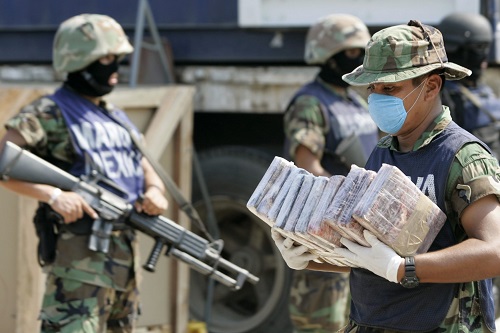Reuters photo
By
Ricardo Swire
Years of compiled law enforcement data highlights how powerful drug cartels only became wealthy and influential after South American cocaine trafficking routes shifted from the Caribbean to Mexico.
Guadalajara and Gulf Cartels were the first two trafficking organizations to originate from such route diversion. One of Guadalajara Cartel’s three founders eventually privatized the Mexican drug trade, the criminal syndicate controlling narcotics production from the golden triangle down the rugged Sierra Madre Occidental mountain range to the Tierra Caliente region.
Guadalajara Cartel controlled border-crossings from Tijuana and Juarez to the US. CARICOM intelligence briefs noted boss-of-bosses Miguel Gallardo remained in the shadows for several years while lieutenants, who were also ranking traffickers, attended secret meetings convened at “the Plazas” a house in Acapulco Mexico. After a Federal Police counter-narcotics enforcement raid detained the notorious Capo, Guadalajara Cartel fractured into two sections popularly known as Sinaloa and Tijuana Cartels.
South American drug cartels extensively grow marijuana and poppies, finished products destined for the USA. As part of Sinaloa Cartel’s production and expansion blueprint the Artist Assassins, Gente Nueva and Los Mexicles street gangs were contracted to confront rival Juarez Cartel, in an effort to control additional routes. The Juarez Cartel oversees three main drug entry points to El Paso, Texas and partners with La Linea and Barrio Azteca gangs.
Together the criminal collaboration manages one of the primary drug routes to America. On April 12, 2018 the US Federal Bureau of Investigations (FBI) added Rafael Quintero aka “The Prince,” a legendary Mexican Cartel boss, to its Ten Most Wanted Fugitives list. His bounty increased from the November 2013 Washington tagged US$5 million to US$20 million. Intelligence reports identified The Prince as mastermind of the renowned Beltran Leyva Cartel incursion of Sinaloa Cartel territory.
Mexico’s Prosecutor General Office enforcement operation included an arrest warrant for the Prince. Shortly after the decree was effectively served and the fugitive in custody a court order released him. A Jalisco State judge ruled the Prince’s trial, for murder of a US Drug Enforcement Administration (DEA) Special Agent, was “a violation of due process.” The Mexican judge’s criticism related to the previous trial being convened in federal rather than state court. Not long before American justice officials requested the Capo’s extradition, but were unsuccessful due to unofficial early warning and the Prince’s convenient disappearance.
Ricardo Swire
Ricardo Swire is the Principal Consultant at R-L-H Security Consultants & Business Support Services and writes on a number of important issues.



No Comments Yet!
You can be first to comment this post!